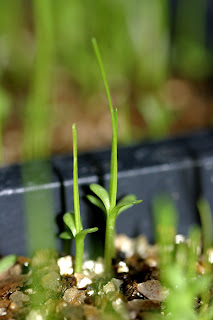Seed trays of newly emerged native plant seedlings bring a touch of spring to Powell Gardens' greenhouses. Powell Gardens' mission to embrace the Midwest's spirit of place makes growing, promoting, displaying and conserving native plants an important activity. Each late winter we grow a wide array of native plants for Kansas City Wildlands (http://www.kcwildlands.org/).
Kansas City Wildlands is a not-for-profit coalition of resource professionals, private conservation organizations and conservation-minded citizens who restore and manage the finest remnants of native "wildlands" in Greater Kansas City. Powell Gardens is a partner in this coalition and our contributing role is to grow unique and rare native plants for Kansas City Wildlands restoration activities. All the seeds we plant are collected by Wildlands-trained volunteers from local natural areas.
Some of the seed is started in sheltered seed flats resting on heat mats to encourage germination. Each fall, the seed is brought to Powell Gardens by KC Wildlands volunteers. Our Senior Gardener Marie Frye then becomes in charge of growing these plants. The seed must first be stratified as per each individual species. For example: some seed must be chilled for up to three months and be kept moist at all times before being put in seed trays or flats to germinate. Some seeds require scarification -- that is the breaking of the seed coat for germination.
Here seedling Blazingstars (Liatris) can be seen from the corner of the seed flat.
Wednesday, February 27, 2008
Restoring Native Plants
Seedling Blazingstars look like tiny swords! In two seasons they will display spires of royal purple, nectar rich blooms -- important nourishment for a plethora of beneficial insects.
Seedling Wild Indigos (Baptisia) put out three-parted, clover-like new leaves. Wild Indigos are important legumes in native prairies as they fix nitrogen into the soil and improve its fertility.
Here Purple Milkweed (Asclepias purpurescens) is well on its way with its first new leaves. Purple Milkweed is a wildflower in decline. It prefers savanna or open woods to live and without help from organizations like KC Wildlands, it would certainly be on its way to extinction in our area. KC Wildlands burns or removes invasive brush to maintain its habitat.
All of the seedlings are scheduled to be "moved up" into larger cells ranging from 18 to 36 plants per tray. (Hopefully a blog later this week to show the process) In early May KC Wildlands volunteers will pick up the flats of baby plants and take them to various restoration projects around the metro region. Go to http://www.kcwildlands.org/ if you are interested in volunteering with their important work and be a part of planting these plants back into their native habitat.
We believe this "in-situ" conservation is the most important way to conserve our flora. Sometimes it is important to conserve them by planting them at the gardens, which is known as "ex-situ" conservation. Powell Gardens is a major player in some federally endangered plant conservation, including growing plants for the federal recovery plan of the severely endangered Mead's Milkweed.
Posted by
Kansas City's botanical garden
at
9:09 AM
![]()
![]()
Labels: conservation, greenhouse, production, wildflowers
Subscribe to:
Post Comments (Atom)








No comments:
Post a Comment